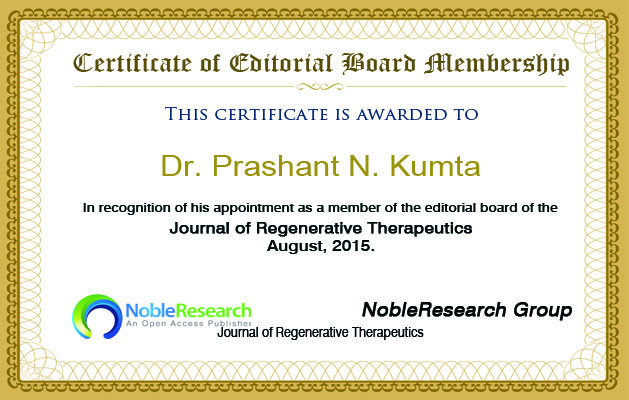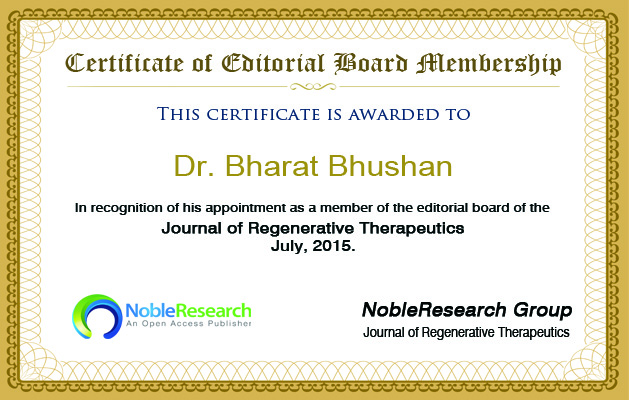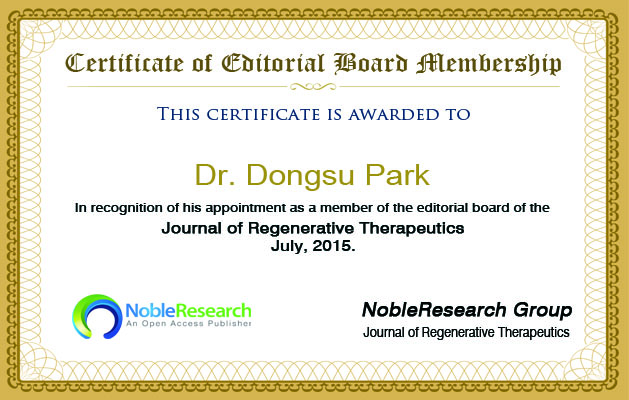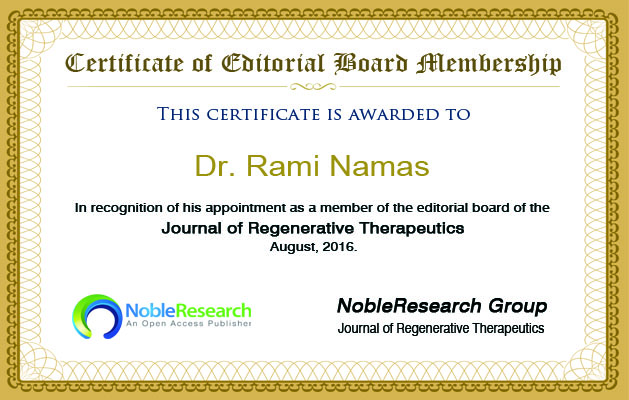
The email alerts service allows anyone who registers their email address to be notified via email when new content goes online.
Recommend this journal to your friend or library.
Manuscripts should be submitted online through our website or as an email attachment to the editorial office at editor.jrt@nobleresearch.org
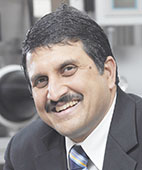
- Dr. Prashant N. Kumta, Professor,
- Department of BioEngineering,
- Chemical and Petroleum Engineering,
- Mechanical Engineering and Materials Science,
- Department of Oral Biology,
- Swanson School of Engineering and School of Dental Medicine,
- McGowan Institute of Regenerative Medicine,
- University of Pittsburgh, USA.
- BiographyOpen or Close
Professor Kumta obtained his Bachelor of Technology in Metallurgical Engineering from the Indian Institute of Technology, Bombay, India in 1984. He then obtained his M.S. and Ph.D. degrees in Materials Science and Engineering from the University of Arizona in 1987 and 1990, respectively. He recently joined the University of Pittsburgh after serving on the faculty at Carnegie Mellon University for 17 years, and is currently the Edward R. Weidlein Chair Professor in the Swanson School of Engineering and the School of Dental Medicine. His main research interests are in the synthesis, structure and properties of nanostructured materials for electrochemical electronic, bone tissue engineering, biomineralization, bio-sensing, and non-viral gene delivery applications. Professor Kumta is the recipient of the NSF Research Initiation Award (RIA), Fellow of the American Ceramic Society (ACerS), American Institute of Medical and Biological Engineers (AIMBE). He has edited/co-edited 9 books, given more than 125 invited and 430 oral presentations, and is the author and co-author of more than 255 refereed publications. He is currently the Editor in Chief of Materials Science and Engineering, B, Advanced Functional Solid-State Materials, an International Journal by Elsevier.
- ExpertiseOpen or Close
Professor Kumta current reseaech interests are Novel Synthesis and Characterization of Advanced Nanostructured Materials, Novel Non-Oxide Sol-Gel synthesis, Colloidal Processing, High-Energy Mechanical Milling, Mechanochemical Synthesis,Microstructure and properties of Novel Electronic and Electrochemically active Materials; Novel low temperature physiologically compatible approaches to Bioceramic and Biologic Biomaterials for Bone Tissue Engineering, Gene Delivery, and Biomineralization.Novel low temperature approaches to smart functionalized biofunctional bone cements and polymer-ceramic hybrid structures for craniofacial and orthopedic applications. Innovative Processing of Nanostructured Ceramics, Metals,Semiconductors and Biomaterials, Structure-Property Relationships for Electronic, Electrochemical, Bone Tissue Engineering, and Plasmid Gene Delivery applications,Novel nano-structured materials for Li-ion Batteries, Direct Methanol Fuel Cells, Hydrogen Fuel Cells and Supercapacitors,Nanostructured Catalysts and Supports for Water Electrolysis;Novel Biodegradable Metals for Craniofacial and Orthopedic Applications; Engineering natural polymers and membrane architectures for Embryonic Stem Cell (ESC) differentiation pathway assessment.
- CertificateOpen or Close
- PublicationsOpen or Close
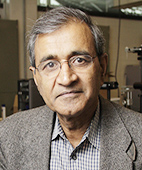
- Dr. Bharat Bhushan, Professor
- Director, Nanoprobe Laboratory for Bio- & Nanotechnology and Biomimetics,
- Affiliated Faculty, John Glenn College of Public Affairs,
- The Ohio State University, W390 Scott Lab,
- 201 W. 19th Avenue, Columbus,
- Ohio 43210-1142, USA.
- BiographyOpen or Close
Prof. Bharat Bhushan is Eminent Scholar of Ohio and The Howard D. Winbigler Professor and Director of Nanoprobe Laboratory for Bio- & Nanotechnology and Biomimetics (NLB2), Deptartment of Mechanical Eng., and Graduate Res. Faculty Advisor, Department of Materials Science and Engineering, Affiliated Faculty, Battelle Center for Science & Technology Policy, John College of Public Affairs, Ohio State University. Dr. Bhushan graduated with a B.E. (Hons.) in Mechanical Engineering from Birla Institute of Technology and Science, Pilani, 1970; M.S. Mechanical Engineering from Massachusetts Institute of Technology, Cambridge, Mass., 1971 and M.S. Mechanics from University of Colorado, Boulder, Colo., 1973. Dr. Bhushan received his Ph.D. in Mechanical Engineering from University of Colorado, Boulder, Colo., 1976. Dr. Bhushan has received many awards and honors, some of them are Pi Tau Sigma & ASME Charles R. Richards Memorial Award to recognize outstanding achievement (2000); ASME Robert Henry Thurston Lecture Award for pioneering research in nanotribology and nanomechanics (2004); The OSU Research News of the Year - Nature Inspires Nanotech, selected as the coolest science story (2005); STLE International Award for Outstanding Contributions to Tribology and/or its Related Sciences (2014) and BITS (Pilani) Distinguished Alumni Award to recognize and honor for bringing laurels to their alma mater (2015). Dr. Bhushan authored 8 scientific books, 90+ handbook chapters, 800+ scientific papers and also edited more than 50 books and holds 20 U.S. and Foreign Patents.
- ExpertiseOpen or Close
Prof. Bharat Bhushan research interests are fundamental studies in the interdisciplinary areas of bio/nanotribology/nanomechanics and nanomaterials characterization in bio/nanotechnology and biomimetics with a focus on scanning probe techniques.
- CertificateOpen or Close
- PublicationsOpen or Close
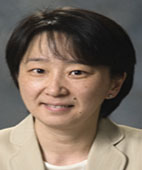
- Dr. Qing Ma,
- Associate Professor of Cancer Medicine,
- Section of Transplant Immunology,
- University of Texas,
- M.D. Anderson Cancer Center,
- Houston, TX. USA.
- BiographyOpen or Close
Qing Ma is an associate professor in the Department of Stem Cell Transplantation and Cellular Therapy at University of Texas M.D. Anderson Cancer Center. As a graduate student at Thomas Jefferson University, her thesis project was on the role of ALL/MLL gene in leukemogenesis, and her published work in PNAS was one of the first reports on DNA methylation and epigenetics in cancer. Qing Ma did her postdoctoral training in Dr. Tim Springer’s lab at Harvard Medical School on the function of adhesion molecules chemokine and integrin in immune system. Her research on the role of chemokine receptor CXCR4 in hematopoiesis was published in PNAS and Immunity. The progenitor cell retention mechanism demonstrated and proposed in her publications provided the rationale for a novel method of stem cell mobilization and leukemia therapy developed at MDACC. She also investigated and published the activation mechanism of integrin LFA-1 in immune responses. To pursue her interest in translational research, she joined Dr. Rainer Storb’s lab at Fred Hutchinson Cancer Research Center as a research associate for one year, to obtain knowledge and develop projects of clinical research in stem cell transplantation and immunotherapy. Qing Ma joined the Department of Stem Cell Transplantation and Cellular Therapy in 2003, with the goal of establishing independent research program with a major focus on adoptive immunotherapy for leukemia and lymphoma patients undergoing allogeneic bone marrow transplant (BMT), and translating our basic discoveries into the clinic.
- ExpertiseOpen or Close
Qing Ma research interests includes elucidating the regulatory mechanisms of T cell activation and control T cell mediated immune responses in GVHD and GVL. Her lab investigates the function of adhesion molecules in mediating alloimmune responses through regulating the migration, differentiation and activation of T cells. Qing Ma lab has been focusing on chemokine receptor CCR5 and integrin LFA-1, which regulate the function of naïve, effector and memory T cells. They have demonstrated CCR5 mediated immune responses in human GVHD, and their published clinical research data provided rationale for clinical trials to selectively ablate CCR5 to alleviate GVHD and establish tolerance. Her lab made original discoveries in elucidating the molecular mechanisms of LFA-1 activation and demonstrated a novel method of preventing GVHD by modulating LFA-1 activation with lovastatin. Moreover, they have investigated the role of complement system in GVHD alloimmune responses, and demonstrated that C3-deficient mice Th1/17 differentiation in GVHD, that opens up a novel avenue of clinical translational research focusing on the use of anti-complement based treatment for GVHD. The long-term goal of her research is to understand the fundamental mechanisms of T cell activation and develop novel methods to prevent GVHD and improve leukemia immunotherapy.
- CertificateOpen or Close
- PublicationsOpen or Close
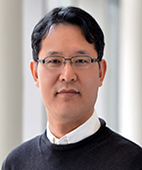
- Dr. Dongsu Park, Assistant Professor
- Department of Molecular and Human Genetics,
- Department of Pathology & Immunology,
- Faculty, Center for Skeletal Medicine and Biology
- Baylor College of Medicine,
- Houston, Texas,
- USA.
- BiographyOpen or Close
Dr. Dongsu Park is an Assistant Professor in the Department of Molecular Human Genetics (DMHG) and a faculty in the Center for Skeletal Medicine (CSM) at the Baylor College of Medicine where he has been a faculty member since January 2014. Dr. Park was an undergraduate at the Kyungpook National University, South Korea where he received his Bachelor of Science degree in molecular biology. In 2007, he completed his Ph.D in Immunology at Baylor College of Medicine with Professor David M. Spencer, where he studied the mechanisms of dendritic cell survival in the context of developing a cancer vaccine as well as the pharmacological regulation of Wnt signaling in stem cells. From 2007 to 2014, he worked as a postdoctoral fellow and an instructor at the Massachusetts General Hospital and Harvard Medical School with Dr. David Scadden, the Director of Harvard Stem Cell Institute and studied the turnover and fate of mesenchymal and osteolineage cells in bone regeneration and repair in living animals. Dr. Park has received many honors and awards during his scientific career.
- ExpertiseOpen or Close
A primary goal of Dr. Park’s research is to understand the biology of mesenchymal/skeletal stem cells in tissue regeneration and cancer. To address these questions, Dr. Park’s laboratory has developed a new strategy utilizing genetic pulse-chase models and advanced live-animal imaging technology. The strength of these techniques is that they can track kinetics and dynamics of stem/progenitor cells within intact tissues allowing novel ways to determine mechanisms of regeneration and injury repair in living animals. Dr. Park’s laboratory is also interested in the identity and function of mesenchymal populations in non-skeletal tissues such as tendon and muscle. The laboratory has the tools to answer important questions in musculoskeletal biology using a variety of genetic, immunologic, and microscopic technologies with the goal of identifying molecules and mechanisms that regulate mesenchymal cells of different tissue origin. These studies will elucidate fundamental aspects of tissue regeneration and may lead to the development of new regenerative medicine strategies and of new targets in the malignant microenvironments in cancer.
- CertificateOpen or Close
- PublicationsOpen or Close
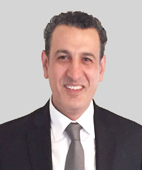
- Dr. Rami A. Namas,
- Assistant Professor,
- Department of Surgery,
- McGowan Institute for Regenerative Medicine,
- University of Pittsburgh,
- W940 Biomedical Sciences Tower,
- Pittsburgh, PA 15213,
- USA.
- BiographyOpen or Close
Dr. Rami Namas is an Assistant Professor, Department of Surgery, University of Pittsburgh. Prior to this appointment, he was a Research Associate and a Postdoctoral Fellow in the Department of Surgery as well as a Postdoctoral Fellow in the Department of Critical Care Medicine. Dr. Namas attended University of Oxford, United Kingdom, where he completed his undergraduate studies in Human Biology and English/Arabic Translation. He obtained a Bachelor Degree in Medicine and Surgery from the Al-Fateh University, School of Medicine, Tripoli, Libya. Dr. Namas is a member of various professional organizations, including the Shock Society, the General Medical Council (United Kingdom), and the Libyan General Medical Council. Dr. Namas’ long-term research goals are to obtain high-dimensional, dynamic data on the etiology and progression of various inflammatory processes and diseases in samples derived from cells, animals, and human individuals; to create computational models based on these data; and, to modulate the inflammatory response in an optimal spatial, temporal, and individual- disease-specific manner.
- ExpertiseOpen or Close
Dr. Rami Namas research interest has focused on mechanisms regulating trauma-induced inflammation coupled with data-driven modeling to gain insights into the dynamics of the inflammatory response in human blunt trauma. Dr. Namas recent work has focused on identification of novel set of inflammation biomarkers that could stratify blunt trauma patients within 24 hours of hospital admission that went on to develop a complicated clinical course. Data-driven modelling revealed that patients with complicated clinical course exhibited distinct dynamic networks that could stratify patients upon admission that follow a complicated clinical course.
- CertificateOpen or Close
- PublicationsOpen or Close




